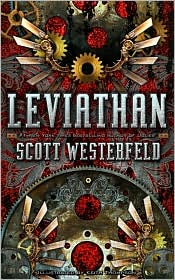
Science fiction and occult master young adult author Scott Westerfeld tries something new with his newest novel: alternative history. The novel starts in the summer of 1914, just before the assassination of the Archduke Franz Ferdinand and his wife Sophie in Sarajevo. Alek, there son is still at home, but finds himself being rushed out by his tutor and fencing trainor in the middle of the night. While Franz Ferdinand and Sophie had survived the initial attack by a Serbian shooter on the streets of the city, they were killed later that day. Now their son is in danger.
That is not the only thing about this alternate history. While technology has a strong presence in this world, it is a very different kind. Germany, Austria, and their allies are Clankers, using steam-power to run their machines. Rather than tires and tank-treads, their vehicles move around on 2, 4, 6, or even 8 legs like creatures from the natural world.
Alek and his mentors flee aboard a small two-legged vehicles with the hopes of making it to the safety of neutral Switzerland. The problem is that there seems to be no one they can trust.
On the other side is England, France, Russia, and their allies, who are called Darwinists. In this world, Darwin not only figured out the theory of evolution, but he sorted out how DNA works. This has allowed his followers to use their knowledge to base their technology solely on the natural world. They bioengineer creatures and animal web systems to substitute for their various modes of technology. Since the animals are engineered, the Clankers view their enemies as being unnatural. The Darwinists view the Clankers as being dirty and bad for the environment.
Alek's is not the only perspective presented. Readers are introduced to Deryn Sharp, an orphaned Londoner who hopes to follow in her father's footsteps by being a military pilot. The problem is that women are not allowed to be in the military, and her remaining family are hoping to convince her to be a more appropriate young lady. Instead, Deryn runs away, pretends to be a boy, and joins the British Air Service. After her initial training, she finds herself assigned as a midshipman aboard the Leviathan a hydrogen-based airship compiled of a large whale, bats, bees, airborn jellyfish to form a really powerful militaristic animal web.
It probably would not be a surprise to any reader that the two characters are destined to meet, forcing a confrontation between technologies, social backgrounds, and beliefs.
This is one of the best books I have read recently. The characters are extremely well-defined, and their stories are compelling. Westerfeld has done a nice job of creating a strong setting based loosely on real history while throwing in enough otherworld-ness to add a nice twist. Their is no shortage of action and adventure for both Alek and Deryn as the story progresses.
The real strength of the book, which is true of most serious science fiction, is its highlighting of social mores. The role of women in society, particularly at the time of World War I is greatly highlighted as is how children often play a role in warfare. There is also a careful consideration of how it is so easy to vilify the "other" or the unknown because we are not familiar with it. Sometimes that feeling lessens as we learn more about the "enemy."
Westerfeld always includes a really good Author's Note that highlights the people and events in the book that were real in our history. He also highlights what he changed, and why. He says this about the book in the Author's Note:
"So Leviathan is as much about possible futures as alternate pasts. It looks ahead to when machines will look like living creatures, and living creatures can be fabricated like machines. And yet the setting also recalls an earlier time in which the world was divided into aristocrats and commoners, and women in most countries couldn't join the armed forces -- or even vote.
"That's the nature of steampunk, blending future and past."
I can't wait for the next book in the series!


